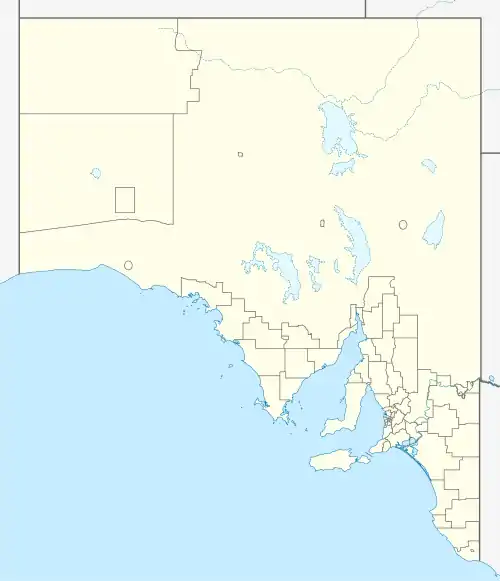Oodnadatta Airport | |||||||||||||||
|---|---|---|---|---|---|---|---|---|---|---|---|---|---|---|---|
| Summary | |||||||||||||||
| Airport type | Public | ||||||||||||||
| Operator | Outback Communities Authority[1] | ||||||||||||||
| Location | Oodnadatta, South Australia, Australia | ||||||||||||||
| Elevation AMSL | 386 ft / 118 m | ||||||||||||||
| Coordinates | 27°33′36″S 135°26′42″E / 27.56000°S 135.44500°E | ||||||||||||||
| Map | |||||||||||||||
 YOOD Location in South Australia | |||||||||||||||
| Runways | |||||||||||||||
| |||||||||||||||
Oodnadatta Airport (IATA: ODD, ICAO: YOOD) is an aerodrome that services Oodnadatta, South Australia, Australia.
History
It was utilised by the Royal Australian Air Force's No. 34 Squadron to courier equipment and stores, transport troops and utilised by RAAF and United States Army Air Force fighter and bomber aircraft en route to Darwin, Northern Territory.[2]
The airport holds the record for the hottest temperature recorded in Australia. On 2 January 1960 the temperature was recorded at 50.7 °C (123 °F).[3]
See also
- List of airports in South Australia
- Oodnadatta § Climate – climate data
References
- 1 2 YOOD – Oodnadatta (PDF). AIP En Route Supplement from Airservices Australia, effective 2023-11-30, Aeronautical Chart
- ↑ No. 34 Squadron RAAF WW2 service
- ↑ "Temperatures off the charts as Australia turns deep purple". The Sydney Morning Herald. 8 January 2013. Retrieved 8 January 2013.
This article is issued from Wikipedia. The text is licensed under Creative Commons - Attribution - Sharealike. Additional terms may apply for the media files.